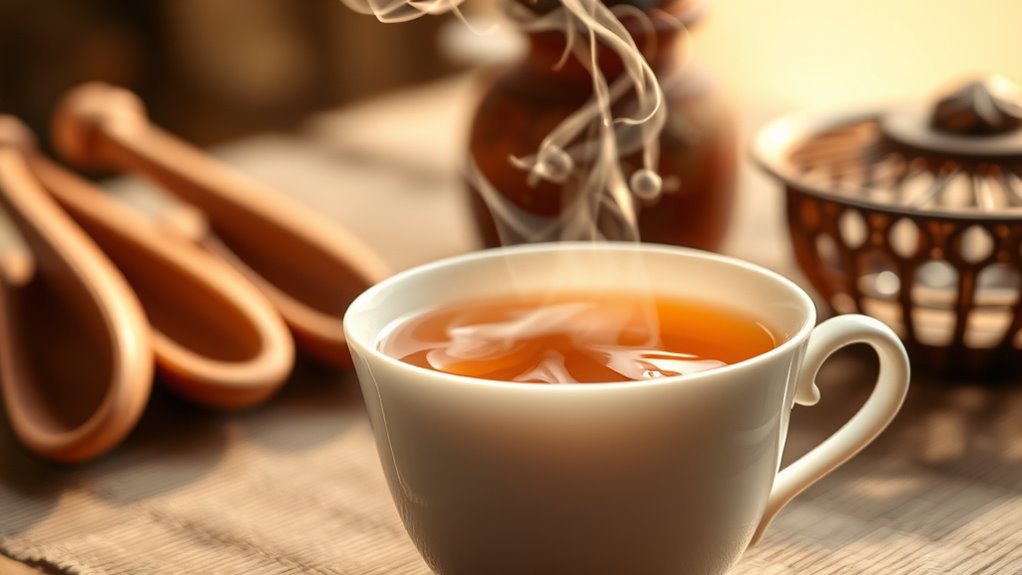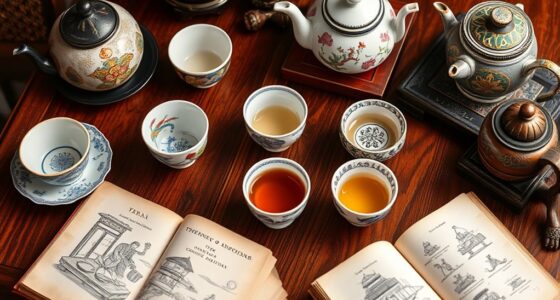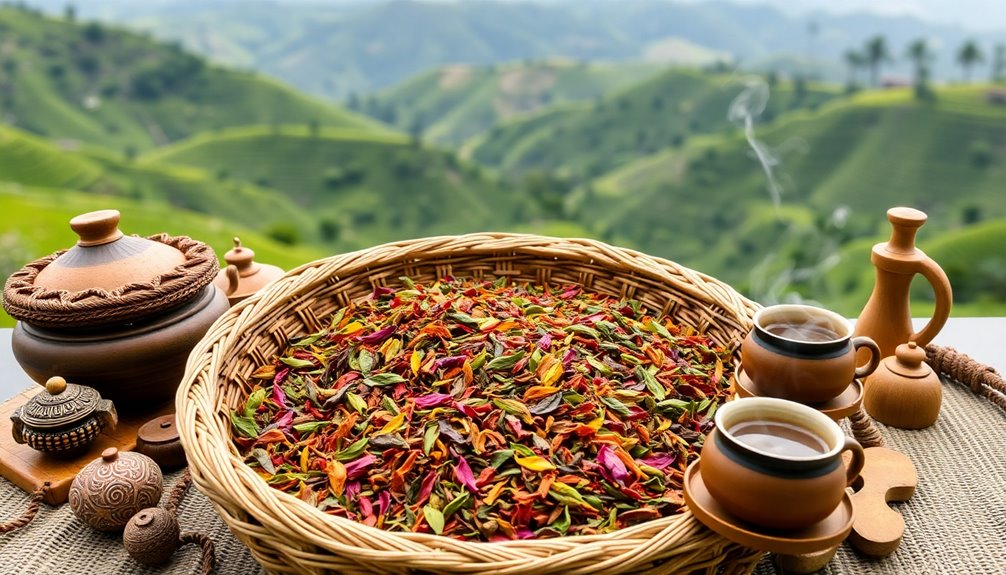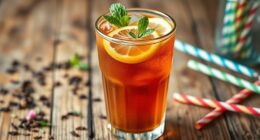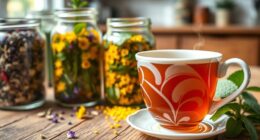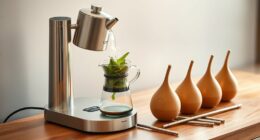When you experience “tea drunk,” you feel a calming, euphoric focus brought on by tea’s natural compounds like caffeine and L-theanine. This balance creates a gentle alertness without jitters, rooted in centuries of cultural tradition that emphasizes mindfulness and connection. The sensation is more than just a buzz—it’s a reflection of tea’s spiritual significance. Keep exploring to uncover how this calming state links deeply to cultural practices and ancient rituals.
Key Takeaways
- “Tea drunk” is a gentle, euphoric state caused by the balanced effects of caffeine and L-theanine in tea.
- It produces calm focus and relaxation, avoiding the jitters common with coffee.
- Culturally, tea drinking is rooted in mindfulness, rituals, and social traditions, enhancing the experience.
- The sensation reflects centuries of cultural practices emphasizing tranquility, reflection, and spiritual connection.
- Understanding the physiology and tradition deepens appreciation of tea’s calming and culturally significant effects.

Have you ever heard someone talk about feeling “tea drunk” and wondered what it really means? It’s a term that captures a unique sensation many tea enthusiasts experience after drinking certain types of tea, especially those rich in caffeine and amino acids like L-theanine. The tea effects often include a gentle euphoria, heightened focus, and a calming relaxation that can feel quite different from the jitters or overstimulation caused by coffee. When you’re “tea drunk,” you might notice a warm, mellow state of mind, with increased alertness paired with a soothing sense of calm. This sensation results from the complex interplay of compounds in tea, mainly caffeine and L-theanine, which work together to produce a balanced, almost zen-like effect. The physiological response involves a mild stimulation of your central nervous system, but with a twist: the presence of L-theanine helps smooth out the sharp edges of caffeine, preventing the typical crash or nervousness linked to other caffeinated beverages. Instead, you get a sustained, gentle alertness that promotes focus without anxiety.
Beyond the physical effects, the cultural significance of tea plays a big role in why many people prize this experience. Tea has been woven into the social and spiritual fabric of numerous cultures for thousands of years. In East Asia, for instance, tea ceremonies are rituals that emphasize mindfulness, tranquility, and connection with others. These practices elevate tea drinking from a simple beverage to a meaningful experience, fostering a sense of community and respect for tradition. In these contexts, feeling “tea drunk” isn’t just about the physical sensations — it’s about embracing a moment of calm, reflection, and harmony. The cultural significance underscores tea’s role as a symbol of hospitality, contemplation, and even spiritual enlightenment. This cultural backdrop helps explain why the effects of tea can be so profound; it’s not just about the caffeine hit, but about the whole experience surrounding it.
When you immerse yourself in the world of tea, understanding the cultural significance enhances your appreciation of the effects you feel. It’s not just a quick caffeine boost but a connection to centuries of tradition and philosophy. Whether you’re sipping green tea in a quiet moment of reflection or enjoying a ceremonial matcha in a communal setting, the experience of feeling “tea drunk” ties into something much larger. It’s a gentle reminder that tea isn’t just a drink—it’s a cultural practice that offers a unique blend of physiological effects and historical meaning, enriching your daily routine with a sense of mindfulness and tradition.
Frequently Asked Questions
Can “Tea Drunk” Vary Between Different Types of Tea?
Yes, “tea drunk” can vary between different types of tea because of differences in tea potency and brewing methods. Stronger teas or longer steeping times release more compounds, intensifying the effects. For example, a robust black tea brewed with a higher temperature may lead to a more pronounced “tea drunk” feeling. So, your choice of tea and how you brew it directly influence your experience.
How Long Does the “Tea Drunk” Effect Typically Last?
You might notice the “tea drunk” effect lasting anywhere from 30 minutes to a couple of hours, depending on your tea tolerance and caffeine metabolism. notably, if you’re more sensitive to caffeine, the feeling could fade sooner. Factors like tea strength and your body’s ability to process caffeine influence how long you feel its effects. So, your experience varies, and it’s worth paying attention to how different teas impact you personally.
Are There Health Risks Associated With Experiencing “Tea Drunk”?
You might wonder if experiencing “tea drunk” poses health risks. While generally safe, it can affect people with caffeine sensitivity, causing jitters or insomnia. Herbal interactions might also lead to side effects or reduce medication effectiveness. If you have underlying health conditions or are sensitive to caffeine, it’s wise to consume tea in moderation and monitor how your body reacts. Always consult a healthcare professional if unsure about your reactions.
Is “Tea Drunk” a Recognized Medical Condition?
Imagine trying a strong cup of tea and feeling lightheaded or overly relaxed—that’s what some call “tea drunk.” Currently, “tea drunk” isn’t a recognized medical condition, but it shares symptoms with acute intoxication from caffeine. If you experience these effects regularly, it might suggest caffeine dependence. While it’s generally temporary, it’s wise to moderate your intake to avoid potential health risks.
How Does “Tea Drunk” Differ Culturally Across Regions?
You might notice that “tea drunk” varies across regions through cultural rituals and social perceptions. In some cultures, it’s seen as a sign of skill and reverence, often celebrated during traditional ceremonies. In others, it’s viewed more casually, just a fleeting feeling of relaxation. These differences shape how people interpret the sensation, influencing whether they see it as a positive experience or something to avoid.
Conclusion
So, next time you sip your tea and start feeling all warm and fuzzy, just remember—you’re not just enjoying a beverage, you’re experiencing “tea drunk.” It’s science, tradition, and a little bit of magic all in one. Don’t worry if you start rambling or feeling overly relaxed; it’s culturally accepted. After all, who needs coffee when you can indulge in a little sip-induced bliss that’s perfectly acceptable, and maybe even encouraged? Cheers to your delightful, slightly tipsy tea journey!

